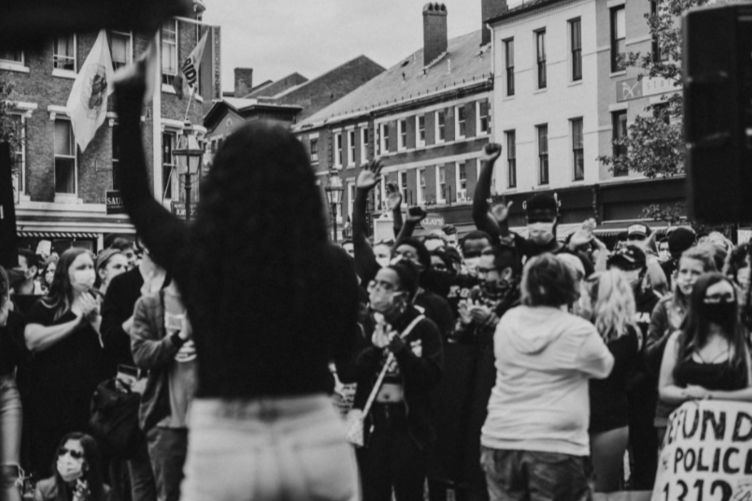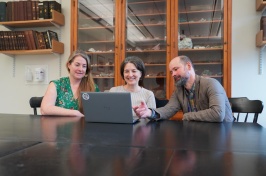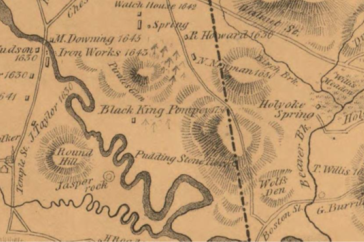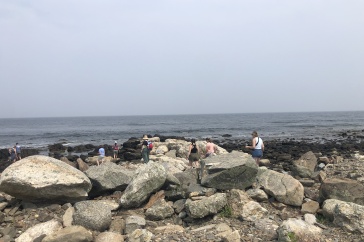
Angelina Gillispie ’20, a recent graduate of the English teaching program at UNH Manchester, published an essay about her experience with the Black Lives Matter rallies and vigils in New Hampshire. At its core, her essay is a call to action to educators and students alike to actively teach and learn about race, systemic racism and how to be an ally. Gillispie will begin pursuing a master’s in teaching this fall and dreams of working for a high school in a community like Manchester—one which is blooming with diversity where she can support, raise up, and teach underrepresented inner-city youth.
Gillispie's full essay, originally published by Great Schools Partnership, is below.
***
In 1972, the first woman—the first Black woman—ran for presidency of the United States. Her name was Shirley Chisholm. This was something that was buried and obliterated from my history books. This was something I did not learn about until I was twenty-two years old.
I am a biracial Black woman and a first-generation college student. I am a future educator. I am empowered by my blackness. As of recently, I tend to reflect on the wisdom, the light, and the love of my Black ancestors. I have been asking myself this question constantly, and I encourage those of you have chosen to read this post to think about it as well. What would our ancestors say if they knew that now, in the twenty-first century, racism is still rooted in public school systems perpetuating this cycle of systemic racism in America?
The Peaceful Vigil
A few weeks ago, I attended an intimate, peaceful Black Lives Matter vigil in Manchester, New Hampshire. This beautifully organized event touched the hearts of every individual who shared this sacred space, and this vigil honored the lives of the Black individuals who have been murdered as a direct result of police brutality. Ahmaud Arbery. Breonna Taylor. George Floyd. And to the countless others before them. Let us not forget their names, their love, and their legacies.
But this vigil also allowed a space in which Black voices could be at the forefront. In this moment, Black voices were valued, honored, and uplifted. The vigil offered a safe space for my fellow Black brothers and sisters to come together in unity, solidarity, and love to share their voices, their pain, their hopes, their love, and their stories. I believe that we all as a community fused together even closer and began this process of healing.
"Do not ever let anyone rob you of your voice, your stories, your experiences. If anyone tries to strip your voice away from you, do not combat them with violence and hatred. This only silences you further. Instead, speak louder. Speak prouder. And speak with all of the love in your heart."
I can vividly remember the feelings of both relief and connection consuming me during this evening. Growing up in New Hampshire—a state with a racial makeup of 93.9% White and just 1.1% Black or African American—I had never felt so tied to my own Black ancestors. I felt so proud to be a part of the Black community, a proudness I had not quite felt before in my almost twenty-three years of life.
Shortly after leaving this event with a few of my friends, feeling more deeply rooted in my Black community now more than ever, we had gotten a call. We found out that just a few short miles away from us downtown, there was a riot that had started—a riot filled with children.
There was no questioning, no debates, no hesitation. In this moment, we knew in our hearts that we had to throw ourselves into the thick of this riot for the sake and protection of our youth. As we were walking toward the riot, we passed crowds of people and business owners, armed with guns and anxiously protecting their establishments. There were sixteen-, fourteen-, twelve-, and even ten-year-old children mere feet away from the barrels of guns, which were also in the possession of the mass of police officers. There was even a SWAT team truck with guns poking up from the top, ready to use if needed. Using my body as a barrier, I placed myself between the youth of our community and these weapons. As a future educator, I could not idly stand by. I had to take action.
Amidst the chaos, myself and my friends had the opportunity to listen to the stories of our youth. One story in particular stood out to me the most, and I want to dedicate this post to the young woman who reminded me what it really means to be both courageous and resilient as Black woman in this world.
The Profound Reminder
She was a beautiful, bright, Black, Muslim teenager, maybe about 15 years old. As she spoke to us, I will never forget her words, her story, or the way her voice quivered with fear. Fear and confusion. Fear and a desire to be heard. She opened up her heart to us and said, “I just want to walk around the hallways of my school not being scared because of the color of my skin.” This is where educators need to begin to pay attention, if they haven’t already.
This intelligent, compassionate, young Black child does not know what it feels like to walk the hallways of her own school feeling safe, secure, or accepted. Shouldn’t schools be safe havens for all students? Where students can feel love and appreciated for who they are? To my fellow public-school educators and administrators: This is a grave problem, and we must fix this.
Our youth are brimming with fear and confusion, and this fear and confusion will eventually well up and manifest itself into anger, violence, intolerance, and hatred. We as educators have the opportunity to eradicate this violence and these emotions, and instead replace them with tolerance, acceptance, empathy, knowledge, and love. Until we do this, we are perpetuating the cycle of racism in our schools nationwide.
We must become cognizant and wake up. Systemic racism is often rooted in our public-school systems. Many Black students and students of color face their first instances of racism in our public schools—myself included. We as educators—and frankly, many other people in this nation—have a tendency to talk about racism as if it is a thing of the past. We have our students open up their whitewashed history books, spend a week or so talking about the Civil Rights Movement, Dr. Martin Luther King Jr., and Rosa Parks, only to have our students close their books as we satisfactorily wash our hands of it and say, “Look how far we’ve come.” Look how far we’ve come? Our youth are still walking around their own schools fearing for their own lives because of the color of their skin. This is not a thing of the past. This is now. This is systemic racism. In the famous words of Black playwright, Suzan-Lori Parks, “History is time that won’t quit.”
Now Is Always the Time for Change
As a current student and future educator, I feel compelled to address my peers. The messages that I have to share come directly from my heart. I have cherished and listened to the words of my Black ancestors. I have devoured and absorbed knowledge from my university classes and my own personal research. It is time for reform. This is what we must do.
To My Fellow Educators:
We must educate our students about the systemic racism we find so deeply embedded in this country today. All educators should be taking courses as they are obtaining their degree related to learning about the history of systemic racism, how and why systemic racism pervades schools in this nation today, how to best teach minority students, how to have discussion about race and racism in the classroom, and how to become allies. Essentially, some of our most important objectives must be that all educators (and those who work within the system) are culturally competent, and that equity-centered education must be implemented in schools nationwide. We must then take this knowledge and pass it along to our students. We must show our students what empathy is every day. We must show our students what acceptance is every day. The skills that we learn can then be passed on to our students, and together, schools can work collectively as equitable communities to work toward eradicating systemic racism. We must teach our students how to become allies. We must teach our students about how to use the power of their voices to become the change-makers and reformers that we so desperately need in this nation today. It is our duty to uplift, empower, and support our Black students.
  |
| Angelina Gillispie '20 speaks at a Black Lives Matter rally |
We must reform our whitewashed curriculum. We must include more Black authors, poets, artists, scientists, mathematicians, inventors, and leaders in our curriculum. Our students must hear the powerful and potent words of our ancestors, such as Maya Angelou, James Baldwin, Langston Hughes, Mae C. Jemison, Muhammed Ali, Ella Baker, Shirley Chisholm, Malcom X, Ida B. Wells, and plenty of others individuals that have done so much for our resilient Black community.
We must implement and highlight more voices of color in our curriculum. You cannot claim that your educational establishment is “inclusive” when the existence of voices of people of color are almost entirely absent. Equity-centered education acknowledges the power structures that control this entire nation. As educators, use this to motivate and inspire other fellow teachers, administrators, and school districts to make the shift that we so desperately need. If our Black students and students of color never see their voices being represented and praised, how do we ever expect them to feel as though their voices truly matter? Let the stories we hear push us to advocate for our students, and fight for educational equity.
To My Fellow Students:
You all have the opportunity to be reformers of our nation. Your capabilities are endless, and you have the power to eradicate systemic racism in this country. Uplift your Black peers. Push and demand to be educated in your own schools about what you can do to become allies; there are an endless amount of ways for you to do this. Do not perpetuate the visceral cycle of oppression and marginalization. Do not perpetuate the hate that so toxically consumes our world because of the hue of someone’s skin. It is not enough to be silent. Use your privilege, use your knowledge, and most importantly, use your heart to combat this cancerous parasite we call systemic racism.
To My Fellow Black Students:
Love your blackness. Become empowered by it. You are our ancestors’ wildest dreams. Your voice not only matters; it is necessary. Cling tightly to your faith. We have a legacy and a responsibility to our ancestors. We have a legacy and a responsibility to future generations. We have the power to set a precedent by demanding our blackness to be represented, honored, and loved. Don’t ever believe that you deserve any less than this. Let us demand that our voices be heard in all classrooms in all grade levels from here on out. Reach out to your school districts and those that have the power and make yourselves be heard.
Most importantly, do not ever let anyone rob you of your voice, your stories, your experiences. If anyone tries to strip your voice away from you, do not combat them with violence and hatred. This only silences you further. Instead, speak louder. Speak prouder. And speak with all of the love in your heart.
You are my brothers and sisters, my sons and daughters, and you have my word that I will fight alongside of you. I will commit my life to the fight for your voices to be heard and cherished.






















































